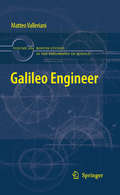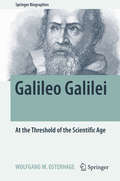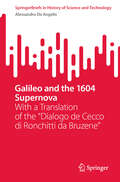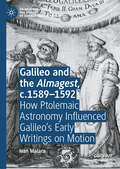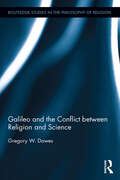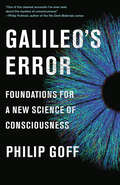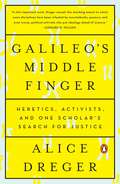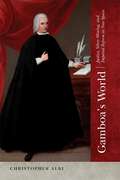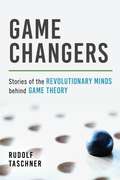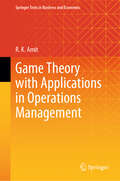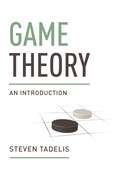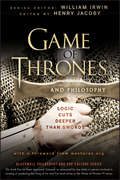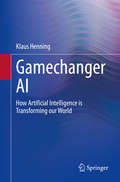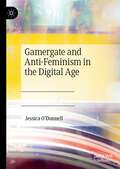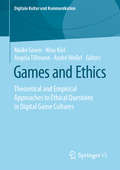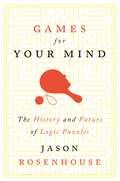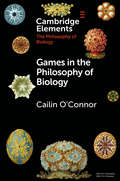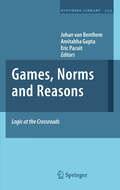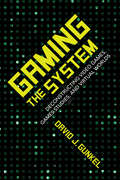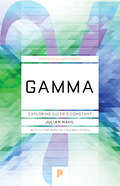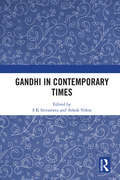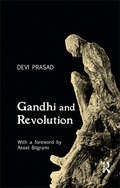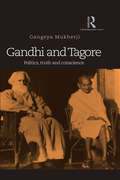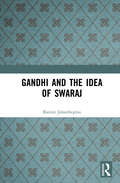- Table View
- List View
Galileo Engineer
by Matteo VallerianiThis work systematically investigates and reconstructs the practical knowledge Galileo shared during his lifetime. Galileo shared many aspects of practical knowledge. These included the methods and experience of foremen and engineers active within various frameworks. Galileo did not always react to such scientific impulses in the same way. On the one hand, he not only shared practical knowledge, but also acted as an engineer, especially within the framework of the art of war at the end of the sixteenth century, and more so during the time he spent in Padua. On the other hand, his scientific achievements were largely based on and influenced by aspects of practical knowledge coming from particular disciplines and activities, without him ever becoming an expert in these disciplines. Two case studies, the first concerned with Galileo's theory of the strength of materials and the second with his achievement of an atomistic heat doctrine, enable a focus on the early modern model of generation of new scientific knowledge based on the conflicting interaction between aspects of practical knowledge and Aristotelian theoretical assumptions.
Galileo Galilei: At the Threshold of the Scientific Age (Springer Biographies)
by Wolfgang W. OsterhageThis new scientific biography explores the influences on, and of, Galileo’s exceptional work, thereby revealing novel connections with the worldviews of his age and beyond.Galileo Galilei's contribution to science is unquestionable. And his conflict with the church establishment of his time is no less famous. In this book, authored by a physicist and history scholar, Galileo's life and work are described against a backdrop of the prior scientific state of the art in his various fields of achievement. Particular emphasis is placed on Galileo's vision of the world in relation to historic and also future cosmological models. The impact of his discoveries and theories for the later development of physics and astronomy is a further focus of the narrative.
Galileo and the 1604 Supernova: With a Translation of the "Dialogo de Cecco di Ronchitti da Bruzene" (SpringerBriefs in History of Science and Technology)
by Alessandro De AngelisThis book is about the 1604 supernova and presents the translation of key documents discussing this astronomical event in Italy. Only seven Galactic supernovae visible to the naked eye are documented, with the 1604 event, the last in history, profoundly impacting astronomy, cosmology, and culture in general. The 1604 supernova challenged the prevailing belief in the unchanging nature of stars. Astronomers like Galileo and Kepler, alongside counterparts from Arab, Chinese, and Korean backgrounds, collaborated to explain its origin, analyzing astronomical and astrological signals five years before the invention of the telescope. Galileo, approached for interpretation while teaching in Padua, cautiously expressed his views in three unpublished lectures, a pseudonymous treatise written in Paduan dialect, and a poem immediately withdrawn, sparking a dispute with Aristotelian scholars in Italy. The 1604 supernova, a pivotal historical event, spurred collaborative efforts and debates, reshaping perceptions of the cosmos. This debate dominated science from 1604 to 1606, preceding Kepler's treatise {\em De Stella Nova}. Remnants of the explosion of the supernova, called today Kepler’s supernova, are still visible and are the subject of studies by modern observatories and discussions in the astrophysical community.
Galileo and the Almagest, c.1589–1592: How Ptolemaic Astronomy Influenced Galileo’s Early Writings on Motion (Palgrave Studies in the History of Science and Technology)
by Ivan MalaraThis book offers a groundbreaking exploration of Galileo Galilei’s engagement with the Almagest, Claudius Ptolemy’s second-century scientific work on the motions of stars and planetary paths. Contrary to the belief that Galileo had little interest in Ptolemaic astronomy, the author investigates whether Ptolemy influenced Galileo’s shift to Copernicanism, the theory that Earth and all other planets revolve around the Sun. This inquiry is pursued through a detailed examination of Galileo’s early writings on motion, namely the so-called De motu antiquiora (c. 1589–1592). By contextualizing Galileo’s initial reception of Ptolemy, the book reveals a fascinating historical backdrop, highlighting how the Almagest was intended to be read and studied in Galileo’s milieu during the last decades of the sixteenth century. The author challenges the conventional ‘Ptolemaic-Aristotelian’ label by showing that early Galileo adhered to a Ptolemaic, yet non-Aristotelian, cosmology supported by an Archimedean-like rationale. Additionally, the book underscores the often-overlooked impact of Theon of Alexandria’s commentary on the Almagest in the sixteenth- and seventeenth-century reception of Ptolemy, suggesting it as one of Galileo’s potential sources. Offering valuable insights for historians of science and early modern astronomy, this book illuminates Galileo’s intricate relationship with astronomical and philosophical ideas, emphasizing the need to re-examine his intellectual journey within a nuanced historical framework.
Galileo and the Conflict between Religion and Science (Routledge Studies in the Philosophy of Religion)
by Gregory W. DawesFor more than 30 years, historians have rejected what they call the ‘warfare thesis’ – the idea that there is an inevitable conflict between religion and science – insisting that scientists and believers can live in harmony. This book disagrees. Taking as its starting point the most famous of all such conflicts, the Galileo affair, it argues that religious and scientific communities exhibit very different attitudes to knowledge. Scripturally based religions not only claim a source of knowledge distinct from human reason. They are also bound by tradition, insist upon the certainty of their beliefs, and are resistant to radical criticism in ways in which the sciences are not. If traditionally minded believers perceive a clash between what their faith tells them and the findings of modern science, they may well do what the Church authorities did in Galileo’s time. They may attempt to close down the science, insisting that the authority of God’s word trumps that of any ‘merely human’ knowledge. Those of us who value science must take care to ensure this does not happen.
Galileo's Error: Foundations for a New Science of Consciousness
by Philip GoffFrom a leading philosopher of the mind comes this lucid, provocative argument that offers a radically new picture of human consciousness—panpsychism.Understanding how brains produce consciousness is one of the great scientific challenges of our age. Some philosophers argue that consciousness is something "extra," beyond the physical workings of the brain. Others think that if we persist in our standard scientific methods, our questions about consciousness will eventually be answered. And some even suggest that the mystery is so deep, it will never be solved. Decades have been spent trying to explain consciousness from within our current scientific paradigm, but little progress has been made.Now, Philip Goff offers an exciting alternative that could pave the way forward. Rooted in an analysis of the philosophical underpinnings of modern science and based on the early twentieth-century work of Arthur Eddington and Bertrand Russell, Goff makes the case for panpsychism, a theory which posits that consciousness is not confined to biological entities but is a fundamental feature of all physical matter—from subatomic particles to the human brain. In Galileo's Error, he has provided the first step on a new path to the final theory of human consciousness.
Galileo's Middle Finger
by Alice DregerJared Diamond, author of Guns, Germs, and Steel and The World until Yesterday"Alice Dreger would win a prize for this year's most gripping novel, except for one thing: her stories are true, and this isn't a novel. Instead, it's an exciting account of complicated good guys and bad guys, and the pursuit of justice."An impassioned defense of intellectual freedom and a clarion call to intellectual responsibility, Galileo's Middle Finger is one American's eye-opening story of life in the trenches of scientific controversy. For two decades, historian Alice Dreger has led a life of extraordinary engagement, combining activist service to victims of unethical medical research with defense of scientists whose work has outraged identity politics activists. With spirit and wit, Dreger offers in Galileo's Middle Finger an unforgettable vision of the importance of rigorous truth seeking in today's America, where both the free press and free scholarly inquiry struggle under dire economic and political threats.This illuminating chronicle begins with Dreger's own research into the treatment of people born intersex (once called hermaphrodites). Realization of the shocking surgical and ethical abuses conducted in the name of "normalizing" intersex children's gender identities moved Dreger to become an internationally recognized patient rights' activist. But even as the intersex rights movement succeeded, Dreger began to realize how some fellow progressive activists were employing lies and personal attacks to silence scientists whose data revealed uncomfortable truths about humans. In researching one such case, Dreger suddenly became the target of just these kinds of attacks.Troubled, she decided to try to understand more--to travel the country to ferret out the truth behind various controversies, to obtain a global view of the nature and costs of these battles. Galileo's Middle Finger describes Dreger's long and harrowing journeys between the two camps for which she felt equal empathy: social justice activists determined to win and researchers determined to put hard truths before comfort. Ultimately what emerges is a lesson about the intertwining of justice and of truth--and a lesson of the importance of responsible scholars and journalists to our fragile democracy.Booklist (starred review)"A crusader in the mold of muckrackers from a century ago, Dreger doesn't try to hide her politics or her agenda. Instead she advocates for change intelligently and passionately. Highly recommended."Kirkus (starred review): "Let us be grateful that there are writers like Dreger who have the wits and the guts to fight for truth." Dan Savage, founder of "It Gets Better" Project; author of American Savage: "If there ever there were a book that showed how democracy requires smart activism and solid data--and how that kind of work can be defeated by moneyed interests, conservative agendas, inept governments, and duplicitous "activists"--this is it. Galileo's Middle Finger reads like a thriller. The cliché applies: I literally couldn't put it down. Alice Dreger leaves you wondering what's going to happen to America if our universities continue to turn into corporate brands afraid of daring research and unpopular ideas about who we are."
Galileo's Middle Finger: Heretics, Activists, and the Search for Justice in Science
by Alice DregerNew York Times Book Review "[S]mart, delightful... a splendidly entertaining education in ethics, activism and science."Editors's Choice, New York Times Book ReviewAn impassioned defense of intellectual freedom and a clarion call to intellectual responsibility, Galileo's Middle Finger is one American's eye-opening story of life in the trenches of scientific controversy. For two decades, historian Alice Dreger has led a life of extraordinary engagement, combining activist service to victims of unethical medical research with defense of scientists whose work has outraged identity politics activists. With spirit and wit, Dreger offers in Galileo's Middle Finger an unforgettable vision of the importance of rigorous truth seeking in today's America, where both the free press and free scholarly inquiry struggle under dire economic and political threats.This illuminating chronicle begins with Dreger's own research into the treatment of people born intersex (once called hermaphrodites). Realization of the shocking surgical and ethical abuses conducted in the name of "normalizing" intersex children's gender identities moved Dreger to become an internationally recognized patient rights' activist. But even as the intersex rights movement succeeded, Dreger began to realize how some fellow progressive activists were employing lies and personal attacks to silence scientists whose data revealed uncomfortable truths about humans. In researching one such case, Dreger suddenly became the target of just these kinds of attacks.Troubled, she decided to try to understand more--to travel the country to ferret out the truth behind various controversies, to obtain a global view of the nature and costs of these battles. Galileo's Middle Finger describes Dreger's long and harrowing journeys between the two camps for which she felt equal empathy: social justice activists determined to win and researchers determined to put hard truths before comfort. Ultimately what emerges is a lesson about the intertwining of justice and of truth--and a lesson of the importance of responsible scholars and journalists to our fragile democracy.Booklist (starred review)"A crusader in the mold of muckrackers from a century ago, Dreger doesn't try to hide her politics or her agenda. Instead she advocates for change intelligently and passionately. Highly recommended."Kirkus (starred review): "Let us be grateful that there are writers like Dreger who have the wits and the guts to fight for truth." Jared Diamond, author of Guns, Germs, and Steel and The World until Yesterday"Alice Dreger would win a prize for this year's most gripping novel, except for one thing: her stories are true, and this isn't a novel. Instead, it's an exciting account of complicated good guys and bad guys, and the pursuit of justice."From the Hardcover edition.
Gamboa's World: Justice, Silver Mining, and Imperial Reform in New Spain (Diálogos Series)
by Christopher AlbiGamboa&’s World examines the changing legal landscape of eighteenth-century Mexico through the lens of the jurist Francisco Xavier de Gamboa (1717–1794). Gamboa was both a representative of legal professionals in the Spanish world and a central protagonist in major legal controversies in Mexico. Of Basque descent, Gamboa rose from an impoverished childhood in Guadalajara to the top of the judicial hierarchy in New Spain. He practiced law in Mexico City in the 1740s, represented Mexican merchants in Madrid in the late 1750s, published an authoritative commentary on mining law in 1761, and served for three decades as an Audiencia magistrate. In 1788 he became the first locally born regent, or chief justice, of the High Court of New Spain. In this important work, Christopher Albi shows how Gamboa&’s forgotten career path illuminates the evolution of colonial legal culture and how his arguments about law and justice remain relevant today as Mexico debates how to strengthen the rule of law.
Game Changers: Stories of the Revolutionary Minds behind Game Theory
by Rudolf TaschnerIn this lively history of game theory, a gifted math educator and science writer explains for lay readers the uses and value of this innovative yet easy-to-understand approach to mathematical modeling. Essentially, game theory interprets life as a game with mathematical rules. By following the rules, decisions can be calculated that result in the greatest benefit for all participants.The author takes the reader from the 17th century through the Cold War to today's age of turbo capitalism. Along the way he introduces such leading contributors as Blaise Pascal in the 17th century, who invented the theory of probability; Ludwig Wittgenstein in the 20th century, who conceived of the world as a play of words; John Nash (the subject of A Beautiful Mind) in the 1950s, who laid the foundation of modern game theory; and today's practitioners who apply the theory to global finance and military strategy.As the author shows, game theory is more than a type of cost-benefit analysis; ultimately, it is a quest for meaning.
Game Theory with Applications in Operations Management (Springer Texts in Business and Economics)
by R. K. AmitThis book provides a broad picture of solution concepts that are highly applicable to operations and supply chain settings and to explicate these concepts with some of the relevant problems in operations management in multi-agent settings. It discusses different strategic situations like games in normal form, games in extensive form, games of incomplete information, mechanism design, and cooperative games, to solve operations problems of supply chain coordination, capacity planning, revenue and pricing management, and other complex problems of matching supply with demand. The recognition and adoption of game-theoretic modeling for operations and supply chain management problems in multi-agent settings have been a hallmark of operations and supply chain literature research during the last few years. Despite research in operations and supply chain management having embraced both non-cooperative and cooperative game-theoretic solution concepts, there is still an abundance of underutilized concepts and tools in game theory that could strongly influence operations management problems. Additionally, with the increasing digitization of operations and supply chain management, the narrative of problems in these areas focuses on blockchain and smart contracts, platforms, and shared economy. The book profits from these new issues being predominantly multi-agent settings and lending themselves to game-theoretical solution concepts. The book's intended audience is the advanced undergraduate and graduate student community of operations and supply chain management, economics, mathematics, computer science, and industrial engineering. It is also relevant for the research community and industry practitioners who use multi-agent architecture in business problems.
Game Theory: An Introduction
by Steven TadelisThe definitive introduction to game theoryThis comprehensive textbook introduces readers to the principal ideas and applications of game theory, in a style that combines rigor with accessibility. Steven Tadelis begins with a concise description of rational decision making, and goes on to discuss strategic and extensive form games with complete information, Bayesian games, and extensive form games with imperfect information. He covers a host of topics, including multistage and repeated games, bargaining theory, auctions, rent-seeking games, mechanism design, signaling games, reputation building, and information transmission games. Unlike other books on game theory, this one begins with the idea of rationality and explores its implications for multiperson decision problems through concepts like dominated strategies and rationalizability. Only then does it present the subject of Nash equilibrium and its derivatives.Game Theory is the ideal textbook for advanced undergraduate and beginning graduate students. Throughout, concepts and methods are explained using real-world examples backed by precise analytic material. The book features many important applications to economics and political science, as well as numerous exercises that focus on how to formalize informal situations and then analyze them.Introduces the core ideas and applications of game theoryCovers static and dynamic games, with complete and incomplete informationFeatures a variety of examples, applications, and exercisesTopics include repeated games, bargaining, auctions, signaling, reputation, and information transmissionIdeal for advanced undergraduate and beginning graduate studentsComplete solutions available to teachers and selected solutions available to students
Game of Thrones and Philosophy
by Henry JacobyAn in-depth look at the philosophical issues behind HBO's Game of Thrones television series and the books that inspired it George R. R. Martin's New York Times bestselling epic fantasy book series, A Song of Ice and Fire, and the HBO television show adapted from it, have earned critical acclaim and inspired fanatic devotion. This book delves into the many philosophical questions that arise in this complex, character-driven series, including: Is it right for a "good" king to usurp the throne of a "bad" one and murder his family? How far should you go to protect your family and its secrets? In a fantasy universe with medieval mores and ethics, can female characters reflect modern feminist ideals? Timed for the premiere of the second season of the HBO Game of Thrones series Gives new perspectives on the characters, storylines, and themes of Game of Thrones Draws on great philosophers from ancient Greece to modern America to explore intriguing topics such as the strange creatures of Westeros, the incestuous relationship of Jaime and Cersei Lannister, and what the kings of Westeros can show us about virtue and honor (or the lack thereof) as they play their game of thrones Essential reading for fans, Game of Thrones and Philosophy will enrich your experience of your favorite medieval fantasy series.
Gamechanger AI: How Artificial Intelligence is Transforming our World
by Klaus HenningArtificial intelligence changes everything. This book encourages readers to consider the challenges of the digital transformation driven by Artificial Intelligence. The reader will discover why this transformation is to be regarded as the greatest cultural revolution since the invention of mass printing and how it can be shaped positively in a value-oriented way. The author pursues the thesis that intelligent objects on the internet, as well as physical objects, are attaining their own consciousness. Using many examples, he shows how these digital companions become our digital partners. This non-fiction book provides many suggestions for one's own living and working environment and is full of examples of how artificial intelligence systems can be implemented. The reader learns what is already possible today and what can be expected in the next ten to twenty years. The book is of interest to anyone interested in AI and the digital transformation - from those responsible in companies, public institutions, and in politics, to all teachers and parents who want to understand what the next generation can expect.
Gamergate and Anti-Feminism in the Digital Age
by Jessica O'DonnellThis book provides an in-depth, feminist and sociological analysis of Gamergate, a major social movement and anti-feminist harassment campaign. Gamergate provides a clear example of both how a modern anti-feminist ‘backlash’ is enacted, and how feminists in the digital age respond. Chapters connect Gamergate to the broader Men’s Rights Activism (MRA) political movement, examining men’s anxieties surrounding what they see as an erosion of male privilege, their conflation of privilege with rights, as well as their use of social media to harass and attack women as a response to their perceived oppression. Likewise, the author analyses the online strategies used by feminists to respond to this backlash, how social media is harnessed to build a feminist movement, the effectiveness of these online strategies, and the parallels that these actions have with those from previous waves of feminism. Finally, the author reflects on what has changed with regards to MRA, online harassment, and digital feminism after the height of Gamergate.This book will be of interest to scholars in Gender Studies, Sociology, and Media Studies.
Games and Ethics: Theoretical and Empirical Approaches to Ethical Questions in Digital Game Cultures (Digitale Kultur und Kommunikation #7)
by Angela Tillmann Maike Groen Nina Kiel André WeßelThe number of digital gamers is increasing worldwide, but public debates about digital games commonly focus on questionable game content or problematic gaming behavior. This book offers a broader ethical perspective on digital game cultures, presenting theoretical and empirical work on the ethical dimensions of the development, production and distribution of digital games, as well as issues relating to responsible gaming and the pedagogical use of digital games. Questions of the communicative-cultural change in game cultures are linked with questions of media education and media ethics. With such a comprehensive approach, the volume promotes ethical discourse on digital game cultures.
Games for Your Mind: The History and Future of Logic Puzzles
by Jason RosenhouseA lively and engaging look at logic puzzles and their role in recreation, mathematics, and philosophyLogic puzzles were first introduced to the public by Lewis Carroll in the late nineteenth century and have been popular ever since. Games like Sudoku and Mastermind are fun and engrossing recreational activities, but they also share deep foundations in mathematical logic and are worthy of serious intellectual inquiry. Games for Your Mind explores the history and future of logic puzzles while enabling you to test your skill against a variety of puzzles yourself.In this informative and entertaining book, Jason Rosenhouse begins by introducing readers to logic and logic puzzles and goes on to reveal the rich history of these puzzles. He shows how Carroll's puzzles presented Aristotelian logic as a game for children, yet also informed his scholarly work on logic. He reveals how another pioneer of logic puzzles, Raymond Smullyan, drew on classic puzzles about liars and truthtellers to illustrate Kurt Gödel's theorems and illuminate profound questions in mathematical logic. Rosenhouse then presents a new vision for the future of logic puzzles based on nonclassical logic, which is used today in computer science and automated reasoning to manipulate large and sometimes contradictory sets of data.Featuring a wealth of sample puzzles ranging from simple to extremely challenging, this lively and engaging book brings together many of the most ingenious puzzles ever devised, including the "Hardest Logic Puzzle Ever," metapuzzles, paradoxes, and the logic puzzles in detective stories.
Games in the Philosophy of Biology (Elements in the Philosophy of Biology)
by Cailin O'ConnorThis is an Element surveying the most important literature using game theory and evolutionary game theory to shed light on questions in the philosophy of biology. There are two branches of literature that the book focuses on. It begins with a short introduction to game theory and evolutionary game theory. It then turns to working using signaling games to explore questions related to communication, meaning, language, and reference. The second part of the book addresses prosociality - strategic behavior that contributes to the successful functioning of social groups - using the prisoner's dilemma, stag hunt, and bargaining games.
Games, Norms and Reasons
by Johan Van Benthem Eric Pacuit Amitabha GuptaGames, Norms, and Reasons: Logic at the Crossroads provides an overview of modern logic focusing on its relationships with other disciplines, including new interfaces with rational choice theory, epistemology, game theory and informatics. This book continues a series called "Logic at the Crossroads" whose title reflects a view that the deep insights from the classical phase of mathematical logic can form a harmonious mixture with a new, more ambitious research agenda of understanding and enhancing human reasoning and intelligent interaction. The editors have gathered together articles from active authors in this new area that explore dynamic logical aspects of norms, reasons, preferences and beliefs in human agency, human interaction and groups. The book pays a special tribute to Professor Rohit Parikh, a pioneer in this movement.
Gaming the System: Deconstructing Video Games, Games Studies, and Virtual Worlds (Digital Game Studies)
by David J. GunkelGaming the System takes philosophical traditions out of the ivory tower and into the virtual worlds of video games. In this book, author David J. Gunkel explores how philosophical traditions—put forth by noted thinkers such as Plato, Descartes, Kant, Heidegger, and Žižek—can help us explore and conceptualize recent developments in video games, game studies, and virtual worlds. Furthermore, Gunkel interprets computer games as doing philosophy, arguing that the game world is a medium that provides opportunities to model and explore fundamental questions about the nature of reality, personal identity, social organization, and moral conduct. By using games to investigate and innovate in the area of philosophical thinking, Gunkel shows how areas such as game governance and manufacturers’ terms of service agreements actually grapple with the social contract and produce new postmodern forms of social organization that challenge existing modernist notions of politics and the nation state. In this critically engaging study, Gunkel considers virtual worlds and video games as more than just "fun and games," presenting them as sites for new and original thinking about some of the deepest questions concerning the human experience.
Gamma: Exploring Euler's Constant (Princeton Science Library #53)
by Julian HavilAmong the many constants that appear in mathematics, π, e, and i are the most familiar. Following closely behind is y, or gamma, a constant that arises in many mathematical areas yet maintains a profound sense of mystery. In a tantalizing blend of history and mathematics, Julian Havil takes the reader on a journey through logarithms and the harmonic series, the two defining elements of gamma, toward the first account of gamma's place in mathematics. Introduced by the Swiss mathematician Leonhard Euler (1707-1783), who figures prominently in this book, gamma is defined as the limit of the sum of 1 + 1/2 + 1/3 + . . . Up to 1/n, minus the natural logarithm of n--the numerical value being 0.5772156. . . . But unlike its more celebrated colleagues π and e, the exact nature of gamma remains a mystery--we don't even know if gamma can be expressed as a fraction. Among the numerous topics that arise during this historical odyssey into fundamental mathematical ideas are the Prime Number Theorem and the most important open problem in mathematics today--the Riemann Hypothesis (though no proof of either is offered!). Sure to be popular with not only students and instructors but all math aficionados, Gamma takes us through countries, centuries, lives, and works, unfolding along the way the stories of some remarkable mathematics from some remarkable mathematicians.
Gandhi In Contemporary Times
by S K Srivastava Ashok VohraThis volume brings together essays which discuss and contextualise Gandhi’s ideas on pluralism, religious identity, non-violence, satyagraha, and modernity. It interrogates the epistemic foundations of Gandhian thinking and weltanschauung, identifies diverse strands within his arguments, and gives it new meaning in contemporary society. This book focuses on Gandhi’s engagements with religious, political and social conflicts, his reflections on faith and modernity, and his argumentative dialogues with Mohammad Ali Jinnah and B R Ambedkar. It provides critical insights into Gandhi’s philosophy and suggests ways of engaging with his ethical and moral ideas in contemporary intellectual and political discourse. Comparing and contrasting Gandhian thought and strategies with contemporary issues and conceptions of religious freedom, conflict resolution, and liberalism; the volume reformulates and reconstitutes his intellectual and political legacy. This book points to new and possible future directions of research on Gandhian concepts and will be useful for scholars in the fields of political science, Gandhian studies, sociology and philosophy.
Gandhi and Revolution
by Devi PrasadThis volume is a collection of Devi Prasad’s essays on Gandhi, social justice and social change. The different essays address themes ranging from Gandhi’s ideals of satyagraha and ahimsa, civil disobedience and non-violence, to the Gandhian approach to education as founded in making and crafting as well as participation in the political and social movements of our times. They also engage the revolutionary potential of Gandhi’s thought, drawing parallels between Lenin and Gandhi and analysing the historical significance of Gandhi’s anti-imperialist yet non-violent political philosophy. In sum, the volume dwells on the continuing, critical relevance of Gandhi in our times. It will be of interest to those in education, political science, peace and conflict studies, history and philosophy, as well as to the general reader interested in Gandhian thought.
Gandhi and Tagore: Politics, truth and conscience
by Gangeya MukherjiThis book brings together the political thought of Gandhi and Tagore to examine the relationship between politics, truth and conscience. It explores truth and conscience as viable public virtues with regard to two exemplars of ethical politics, addressing in turn the concerns of an evolving modern Indian political community. <P><P>The comprehensive and textually argued discussion frames the subject of the validity of ethical politics in inhospitable contexts such as the fanatically despotic state and energised nationalism. The book studies in nuanced detail Tagore’s opposition to political violence in colonial Bengal, the scope of non-violence and satyagraha as recommended by Gandhi to Jews in Nazi Germany, his response to the complexity of protest against the Jallianwala Bagh massacre, and the differently constituted nationalism of Gandhi and Tagore. It presents their famous debate in a new light, embedded within the dynamics of cultural identification, political praxis and the capacity of a community to imbibe the principles of ethical politics. Comprehensive and perceptive in analysis, this book will be a valuable addition for scholars and researchers of political science with specialisation in Indian political thought, philosophy and history. <P><P>Gangeya Mukherji is Reader in English at Mahamati Prannath Mahavidyalaya, Mau-Chitrakoot, Uttar Pradesh, India.
Gandhi and the Idea of Swaraj
by Ramin JahanbeglooThis book examines Gandhi's idea of swaraj as an alternative to the modern concept of political authority. It also introduces the readers to Gandhi’s ideas of moral interconnectedness and empathetic pluralism. It explores the Gandhian belief that "nonviolence" as a moral and political concept is essentially the empowerment of the Other through spiritual and political realization of the self as a non-egocentric subject. Further, it highlights swaraj as an act of conscience and therefore a transformative force, essential to the harmony between spirituality and politics. The volume will be of great interest to scholars and researchers of philosophy, politics, and South Asian studies.
